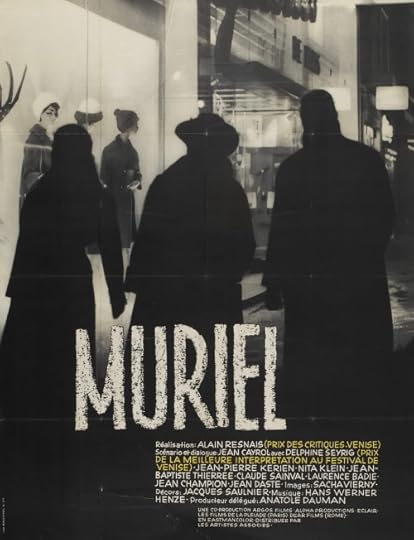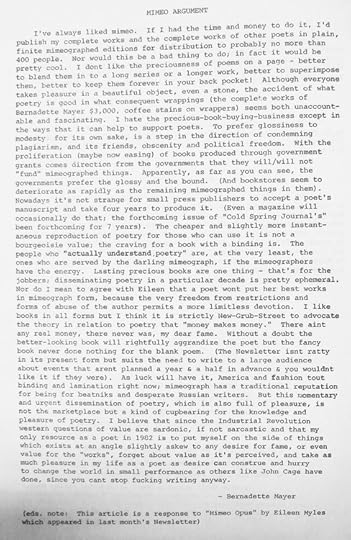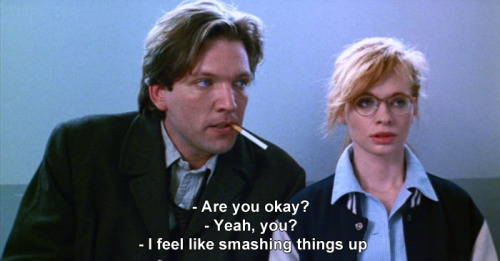Mat Laporte's Blog, page 24
February 16, 2016
oliverfranju:
Muriel ou le temps d'un retour
February 14, 2016
February 1, 2016
She looked straight into my non-existence, at the spot where there is something like a needle-prick,...
She looked straight into my non-existence, at the spot where there is something like a needle-prick, but so deep that one could throw all one’s belongings into it, one’s memory and one’s doubts, one’s demands and one’s subterfuges - yes, all one’s life - and there would still be nothing at all there.
- from “Straw” by Leena Krohn
January 28, 2016
chantal akerman: notes.
It’s twenty years ago. My
conception of what it means to have a home is strangely mediated by the fact
that I’ve never known not having one, never had any home but this room, with
books lining the walls, my favourite ones placed so high that I’d have to stand
on the table to reach them, so they could be kept as far from the world, as
possible. I’m still afraid of the dark.
There’s
a grotesque Minnie Mouse nightlight plugged into the wall, its eyeballs white
and worn from running my fingers over it as though it could tell me what the
future might bring. I run my fingers over the Minnie
Mouse eyeballs once, twice, thrice for luck and I go to bed. I go to bed but I
have a nightmare anyway, and I shriek like I’m dying. My dad comes running and
he tries to calm me. What’s the worst thing that could happen, he asks,
reasonably, stroking my hair. A monster under the bed? I’ll kill it with this
magic sword. An evil wizard in the closet? We’ll say a spell to wish him away. The
worst thing could happen, well, it’s not really so bad at all.
It’s twenty years later. I’m supposed to be working, but
I’m distracted, my lover is supposed to meet me at home, but they’re a half
hour late, messy haired and callous, because they like to make me wait. What’s
the worst thing that could happen, I ask myself absently, like my father
taught me to, years ago, a method to calm myself. They could be dead. That
wouldn’t be so bad, I think to myself, uneasily, but I know that’s not true. I check my phone because
my hands feel too idle. Liz has posted on tumblr – Chantal Akerman has died.
What’s the
worst that could happen? The truth is that, while I sit
here, idle and expectant, someone that I love could leave me.
*
Chantal
Akerman’s last film is titled No Home
Movie. Home, what even is it. I’m not sure
but I know I want it. But maybe that’s just it. Home is a matter of wanting
things. It’s
about futurity, about forcing desire into a shape in which there has to be a
beginning, middle and end. ‘Going home’ necessarily means a journey. It means
finding a place to rest after all the time you’ve been roaming. One can have no
home, but the implicit suggestion is that everybody wants one, or should. No Home Movie. Say it out loud though,
short and curt, and you’ll hear the contempt in it. Home. I don’t want it. No
future. No home.
Chantal
Akerman’s first film, is titled Saute ma
ville, which literally means blow up my town. It was a film that taught me
how to breathe. A young woman, played by Chantal, arrives home. She seems to be
accomplishing a number of household tasks, she drags flowers by their stems haphazardly
through her door, she gets out any number of household items seemingly just to
put them to use, methodically, rigorously. She seems to be preparing for
something but she doesn’t know what. As she works, she hums, a sharp,
unpleasant sound piercing the banality of her movements. It seems absurd, the
tension is suspenseful but only because you can’t tell if it’s supposed to be
comic. She becomes frenzied, she looks in the mirror and tries to clean it but starts
laughing, or crying, joyously, at herself you can’t tell which. There is a
pitch that becomes unsustainable but the only person who lacks certainty about
what is about to unfold is you. The protagonist, there’s something she knows in
the brusqueness of her gestures. No home. She leans over the stove and lights
the gas on fire. There’s a bang, then black. No home movie.
*
In her post
about Akerman’s death, Liz quotes an article that speculates about the cause
for Akerman’s death, and the speculation surrounding her potential suicide
makes me queasy, a form too easily imposed on the feminine.
“Friends
said that Ms. Akerman had been in a dark emotional state after the death of her
mother last year, and that she had had breakdowns. She had recently been hospitalized
for depression…
Liz asks a
simple question, one impossible to answer –“Can we live?”
There’s a bang, and then black. But, can’t we live?
No, but somehow
Saute ma ville remains for me a form
for living. The first time I watched it, I sat back in my chair, I laughed, a
loose, pealing noise, not from happiness but from relief at its total refusal. The
thing is that for Akerman, everything – art, life, death, identity, politics,
exists in entwined architectural paradox. But sometimes all of that can be
evident in a graceful gesture of - Saute
ma ville. Blow up my town. You will only ever get only what I choose to give.
*
Akerman films
are also a form about living, but more than living, they are about living as
waiting. They are about how living is nothing but an endless series of motions,
they are about the instrinsic nightmarishness of the present tense. It snowed for a very long time.
The sparse apartments, and streets of Akerman are never
abstract. Instead, they circle and caress the material conditions of the
void, and say This is life but is this
living? And the answer is no, mostly; and yes, sometimes. There is value in
the painful emptiness of real time, small elations and stupors in the very
fabric of it, its grooves and ridges. There’s intent and rebellion in the narrative
arcs despite the unintentional drama of how life just happens. And I waited.
I’m waiting for
my lover to come home, but they’re not yet here and I’ve moved on to imagining
who I’ll call first when I find out that yes, they’ve been in a car accident,
shorn apart by metal; yes, they were jumped upon by strangers and beaten to a
pulp; yes, that is why they are gone, all, better seeming reasons than quite
simply, they don’t want to come to me. I feel loose and unmoored, I can’t find
the ground. I try to eat something but I can’t bear it - i can’t. I tear the
tip of my fingernail delicately with my teeth.
*
Home?
It’s always been the dream. With Akerman, we are always at home but it is never
ideal. I watch Chantal in Je tu il elle,
waiting in an empty room, sweetened only with the taste of sugar,
too-temporary, too-transient. We are in Jeanne
Dielman’s apartment, trapped by the stifling domestic, we are in her city, in
New York waiting for News from Home,
amidst the traffic and the crowds, we are in the stiff and yet languidly
generous still life of La Chambre, we
are in ancestral East Germany, D’Est.
In every Akerman film, home sweet home is a void even if it remains the center
of breath, the point from which a heartbeat begins to radiate.
Watching, what
I feel strongest always remains what is unseen – some impossible place beyond –
the unspoken claustrophobia of feeling, somehow, always not at home.
*
I’m
hungry. I’m a nightmare, I’m crying and railing and collapsing into the weight
of anxiety. I can’t find the rigid inside parts of myself that remind me how
I’ll be okay. I can’t find a form. My lover finally arrives. They hold me and
tell me to settle, as though I’m a cat. But I’m sharp and defensive like a
razor, I turn my head. I’m hungry, I say and I leave the room. I eat granola
but it’s not what I’m hungry for. Akerman’s women are always hungry. I’m hungry, Anna says, ins Les rendez-vous d’Anna before she finds
another friend, another lover, even her mother to fill a void. I’m hungry, the
narrator says, in Je tu il elle, when
she visits her ex-lover after days locked in her apartment with only a bag of
sugar. More, she says, after she eats a piece of bread spread with nutella, in
big, consuming bites. In Jai’faim Jai’froid, two teenage friends careen through
the city, careless and carefree. Nothing means anything. They smoke and steal
innocently. The banal conditions of a teenage schedule, instinctive, immediate, hungry.
*
The
architect, Richard Neutra was influenced by the pop Freudian psychology of the
1950s, fascinated by
the way in which objects and layouts in Freud’s office were designed to aid
free association. Neutra went on to develop influential architectural design based on psychoanalytic surveys he sent out to clients and sought to develop a
relationship with his clients not unlike the transferential relationship of
psychoanalysis. In an age where Freud’s psychoanalysis had become but more of
like suburban proposition, it seems unsurprising that, like Freud, many of
Neutra’s clients were unhappy women, who believe that his approach could create
curative environments for them within which they could fill a void, houses to
make them feel as though they were enveloped in the embrace of a lover. A
Neutra house become an empathetic mirror, something that gave a woman’s life
form.
I’m hungry, but I refuse to
believe that the world could give me any form that could cure me.
*
Jai’faim, Jai’froid.
Akerman’s women might be hungry but they aren’t searching for a form. They
aren’t even looking for a time, they don’t cater to the whim of the viewer to
find a frame, a narrative, simply because they don’t need one. Instead, what
one might call the realism of these films is affective, dynamic, moves beyond. “Queerness is not yet here,” Jose Munoz
cautioned us at the beginning of Cruising Utopia, “The here and now is a
prison house. We must strive, in the face of the here and now’s totalizing
rendering of reality, to think and feel a then and there.”
Akerman films are not here,
they’re like Jose says, always in the there and then, never fully in the present.
They’re half memory. What she presents is only a surface upon which to stage
the affective landscape of a past. They lose as much as they find. We see always what is ghostly, what is haunting the architecture of the living even as it remains banal. To work in the present tense is also to inherit
the stolid impressions of the past. Which is to say, Akerman films build with
loss, with how it feels to be famished. When we see the two women make love in Je tu il elle, it isn’t romantic. They’re kneading at each other, fighting, and
pressing and slotting into where they can’t and pulling against the sharp
melding of their bodies into each other. What they are building aren’t bodies, or
an erotic, or even romance. Rather, they shape and reshape with and within each
other’s hunger and loss, memory and desire, both individual and with what is older than themselves, an age, ages.
I don’t want to find a
correct shape. I don’t need a cure, or a form. Because Chantal Akerman taught
me that I can build a space that responds to my desire. That cuts, or revenges
or breaks, but also that nourishes and weaves and bends. Like Jeanne says, “I want to build an architecture to inhabit with you”. Something not home, but
then and there. Not home, but somewhere else. No Home Movie. The
nowhere to which we could belong.
- trisha
January 27, 2016
starswaterairdirt:
The Fog, 1980
January 21, 2016
January 3, 2016
Reflections on 2015 heterosexual experiments
It is night it is night it is night and I’m typing on my cell phone typing into this New Year that passes while I like a somnambulist cross over unaware that I’m thirsty or that time passes my heart on fire for all the love lost and returned in a single dream of songs sung wildly in the splendid dream cave.
We rose
To where
Our voices would echo
Like Cecilia Vicuña the voice the voice I weep for the fragments of dream lost but I woke my soul still stirring from breathing in all the voices that echoed there, in that dream cave in the sky
Palace of sand
It’s my heart
Why has it become so hard to hear my heart?
Sing
Sing
Sing into my mouth
The feminists danced into the new year to Talking Heads, “This Must Be The Place” and Lana Del Rey and to Tove Lo singing about blotting out the agony affects that accrue to the body of the one who has just lost love
“You’re gone and I gotta get
hiiiigh all the tiiiiimmmee
To keep you off my mind”
Now that I’ve dabbled with heterosexuality I know the true meaning of pop:
To train you to love
To condition, domesticate and *generate* desire
To induce heterosexual desire
To shape it
Your object
The form of your desire
The tempo of your desire
The fantasies that emerge around your desire
To feed you narratives
Scripts
A catchy melody becomes a mnemonic device for the heterosexuality scripts
I found myself wanting it
That forever-love
That obliterative, sentimental love
That home-in-you feeling
It is a feeling for femininity
A feeling for femininity I never had before
As I have always felt more alien than feminine
On New Year’s Day I woke with the thought
Should I go back to being a lesbian
In 2016
Should this be a kind of…resolution?
Because heterosexuality is anti-woman
To make heterosexuality work you have to become anti-woman
And by that I mean, unbecome
Or aligned yourself with masculinity and against women–to *become* through heterosexuality
I feel like I have something unpleasant sticking to my skin
Maybe heterosexuality is the feeling of having something gross sticking to your skin
You trade your subjecthood for the subject position of the girlfriend
But can you even be a full subject outside the heterosexual matrix?
But what are you as a girlfriend?
The subject position of an…appendage.
Becoming-girlfriend is the pits when you just wanna be weird sisters.
Maybe my 2015 heterosexual experiments were not like the scenarios I alluded to above.
Or were they?
I have been the “mentor” to young men who feel I am more powerful. In 2015 I dated a guy who would constantly fret about what he felt was my intellectual superiority and then I would have to nurse his singed ego back to health by apologizing for being smart or feigning stupidity.
I want that “top-in-life, bottom-in-bed” arrangement Berlant told me about over dinner once.
But is this even possible in heterosexuality?
What is a “powerful woman” in a hetero context?
Women are scorned and seen as weak for loving too much
Resented or seen as cold for not loving enough
In heterosexuality women always lose
Even when these men I’ve been with say I have so much more power than them
The truth is I forfeit a chunk of my power when I enter a heterosexual arrangement
On New Years Eve B, who was drunk, rolled into bed with me while I was brooding
She said, “do you feel like your full self with him? Like full JACKIE WANG?” And I hesitated before saying, well, no, but who do I feel like my full self with?
And then while going through old pictures of all my punky outfits I feel a pang of sadness thinking maybe that shitty dude’s criticism of my clothes got to me more than I thought, because my look/sartorial sensibility has been evolving away from queer punk to something else, not exactly bland femme, but something more subdue, like classy goth witch. Have I lost my élan? What am I becoming?
What I also don’t understand is why these men who are drawn to willful women like me resent me for being willful
Like–why not seek someone out who is submissive? Or is that just no fun?
It’s funny that multiple times my feminism has been attacked after not giving men something that they wanted
In heterosexuality, women lose psychically. Actually I see now that being outside the masculine recognition system for so long protected me, allowed my personality to evolve in ways it never could have if I had been fretting about making myself attractive to men.
Women lose.
This year I dated a man who wanted to possess me fully while he was secretly romantically involved with women in other cities
I even offered to be in an open relationship
But he declined saying it would “damage” our relationship
What he really meant was that he was entitled to my complete loyalty and fidelity, while he had no obligation to me.
But while women in hetero relationships lose psychically, maybe they gain something materially…?
Unfortunately I lost materially with my main 2015 lover, bleh.
Well Alex said she wanted to read some of my reflections on venturing into the world of men for the first time, so late. I sincerely do want to make things work w my current lover, who is not very masculine and definitely not as sociopathic as the main 2015 lover, but I know what I have to give up to make a hetero relationship work. Entering into a hetero relationship is entering into an alliance with patriarchy.
December 27, 2015
December 4, 2015
What’s your dream job?
At the start of every year, every month, every week, I vow to wake up an hour early to write & read before work. I hardly ever succeed. I attribute my failure to my love of sleep, but really it’s a love of dreaming. Isn’t it unfaithful and shortsighted to willingly cut short the magic lantern show? BB teases me for creating a mystical excuse for my laziness, but what do you think?
The alarm shakes me awake five days a week. The little machine beeps and prods me from my body’s natural sleep cycle. But I don’t want to go gentle into that awful workday.
Last night I had a long winding dream set in an old Parisian apartment where I was held captive by three lovely women who were my caretakers. I wasn’t exactly free to leave, but I was well fed and there were plenty of dusty old art books to page through. I was supposed to get married but my shoes didn’t work, and then the veins in my legs bulged dark purple and burst, but slowly. I looked down to find my stems covered in sticky thick bright red blood.
Then the alarm rang, then the thunder clapped, then I mourned. Rather than staying in bed listening to the storm (we’ve had exactly zero rain), I had to drag myself upright, shower in water California can’t spare, and cart my body off to work.
But I’m lucky. Mine’s not so bad, far as jobs go. I have one. I feed myself, I pay rent, etcetera. But dreams are sacred. Jobs? Necessary evil.
But I don’t believe in necessity. I’m so tired of the poverty of our dreams. I used to hate the word ambition, until wise ones told me it’s not being ambitious that’s troubling, it’s what we choose to be ambitious about. If ambition means success in this world, as it is, I want no part of it.
(Whiny child rolling about in a wide green field): But I don’t want to make it in this world, I want another! I don’t want to set my dreams ideas affects emotions creativity & lifeblood on a platter to be reaped by the sharp metallic claws of alienation and financialization! I don’t want to “do what it takes to get ahead”! I don’t want to choose the lesser evil!
I declare that “dream” and “job” shall forever be estranged across an ocean wide as the Milky Way. Wide as the gap between what I produce and what they pay me.
My dream job is not sitting in an insurance hell waiting room drafting a compelling tweet for my employer. My dream job is not dragging and dropping, filing and sorting, exporting and analyzing all the live long day. My dream job is that we don’t offer up our precious meat and blood to capital. The kind of wealth I produce for my boss in this system is not any wealth at all. I want that real stuff, the wealth of dreams. I want the Scrooge swimming pool full of ducats, only instead of bullion it’ll be poems against mining and minting, markets and managers.
Let our dreams be antithetical to jobs. Let our dreams dream the abolition of jobs.
—Alli Warren
November 24, 2015
martinlkennedy:
More Jack Kirby art from the brilliant 2001 A...
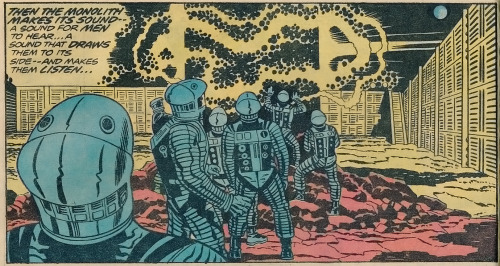
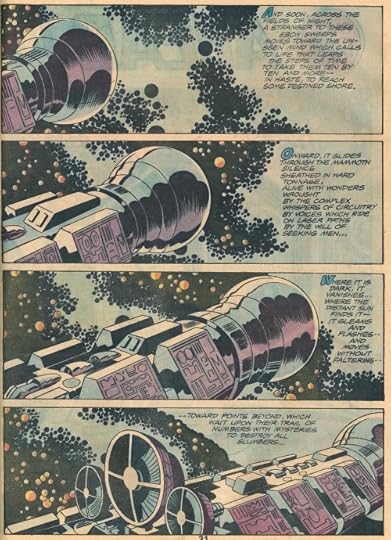

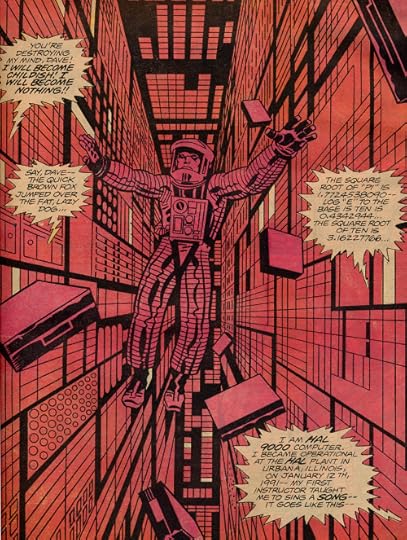
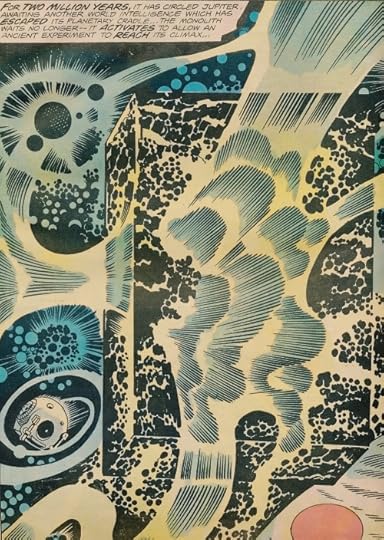

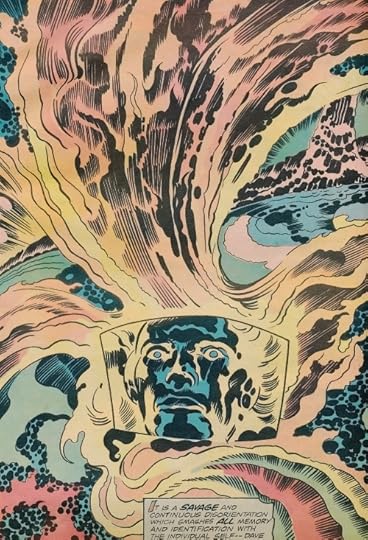
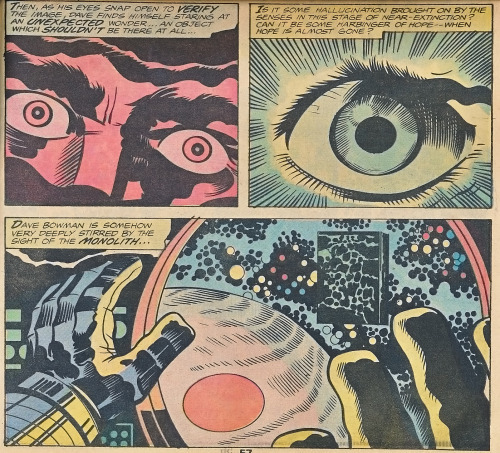
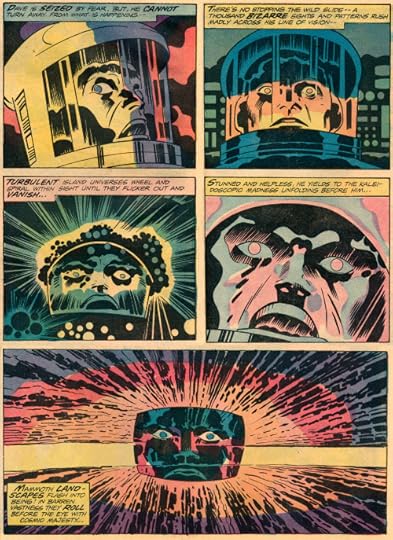
More Jack Kirby art from the brilliant 2001 A Space Odyssey Marvel Treasury Special written, drawn
and edited by Jack Kirby. Inked by Frank Giacoia. Published in 1976.
Mat Laporte's Blog
- Mat Laporte's profile
- 21 followers


